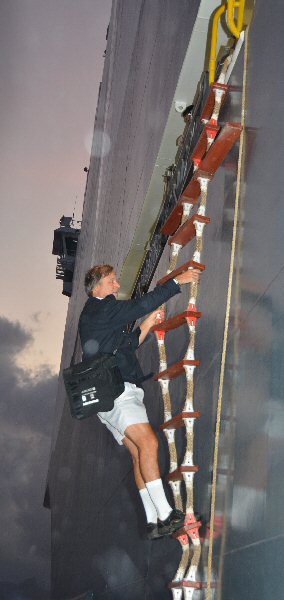Pilotage
 Pilotage is compulsory for all vessels over 100GT in Port Louis. There does not appear to be pilotage exemption for any vessel. However, this may be done bona fide to the port and its facilities.
Pilotage is compulsory for all vessels over 100GT in Port Louis. There does not appear to be pilotage exemption for any vessel. However, this may be done bona fide to the port and its facilities.
Pilots board vessels at about 1.5 nautical miles from the entrance beacons (BA charts 711 and 713) and the time of boarding is communicated to harbour radio. MPA pilots need to discuss manoeuvres with vessel masters. Instructions are conveyed to tugs deployed for the assistance in the movements. Harbour radio has to be informed about the time vessels have been made fast and about the berth numbers. On departure, the same reporting procedures are followed. MPA pilots submit a pilotage certificate for billing purposes.
Vessels have to give a three-hour notice before accosting as per Regulations (the Port Operations and Safety Regulations, 2005). The Port Operations-Commercial Manager has daily meetings with the port operators and the time at which various vessels are to be provided berth facilities is determined at these meetings. Any request for pilotage service is also made at these meetings. In principle, this could be interpreted as meaning that pilots on call duty could be convened for pilotage services with three-hour notice. However, the MPA keeps two pilots on a daily shift for emergency reasons, e.g. ships may need to be moved from one quay to another depending on cargo-handling activities conducted by CHCL. Same arrangements are made for tugs and pilot boats.
The MPA employs professional and experienced mariners i.e. with master’s certificate of competency Class One to effect quality pilotage service. Ship owners require quality assurance. MPA, although it is not a statutory requirement, has adopted the policy of taking on board high calibre pilots who may have the same international recognition at par with masters of the going vessels.
The legal framework for the pilotage service at the MPA consists of the Ports Act, the Port Operations and Safety Regulations (2005) and the Merchant Shipping Act (2007).
The MPA draws inspiration and is broadly guided in matters concerning pilotage services by provisions of the Pilotage Act, 1987, of UK to ensure that it meets international standards. Pilot boats used by the MPA have to comply with statutory requirement as spelt out in the Merchant Shipping Act (2007).
Pilotage service, compulsory for all vessels over 100 GRT, is available round the clock on request. Exception is for white oil and LPG tankers, which are only berthed between sunrise and sunset.
Towage, Salvage and Rescue
- 1 x 2,620 hp (30 tonnes bollard pull)
- 1 x 2,670 hp (30 tonnes bollard pull)
- 1 x 3,600 hp (45 tonnes bollard pull)
- 1 x 5,680 hp (70 tonnes bollard pull for deep-sea towage, fire fighting and search & rescue operations)
- 4 x 1,000 hp (12 tonnes bollard pull) for harbour work.
There is also one small tug of 12 tonnes bollard pull and available at Port Mathurin, Rodrigues.
